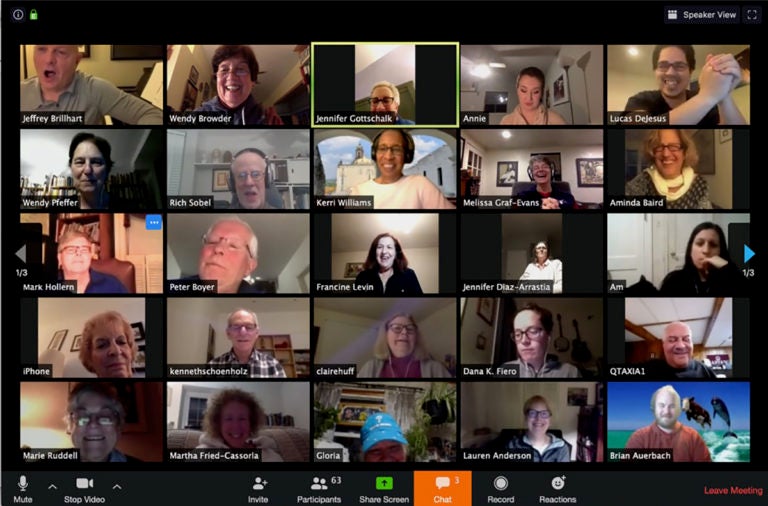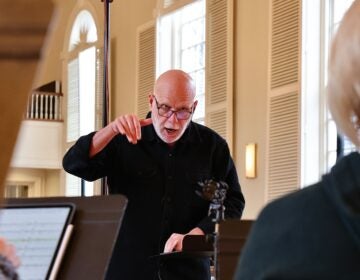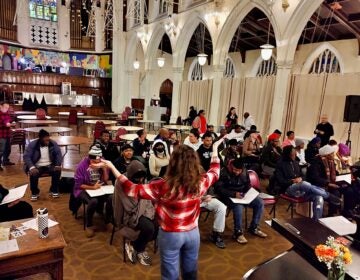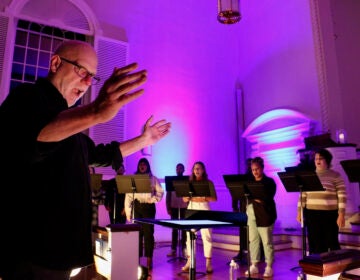Choirs make the most of virtual rehearsals during coronavirus pandemic
Singing together can be fatal during the COVID-19 outbreak. Choral groups find ways to stay together while staying at home.
Listen 3:40
Members of the Singing City Choir hold a virtual practice using the Zoom video meeting app. (Courtesy of Singing City Choir)
Normally, the Singing City community choir in Philadelphia meets every Tuesday evening to sing together. The 85-voice choral group, with members ranging from teenagers and 80-year-olds, had a busy performance schedule this spring.
There were gigs at the Ronald McDonald House and Penn Presbyterian. They were going to get together to prepare meals for homeless people, and in May join the Philadelphia Chamber Orchestra to sing a memorial for the children of the Holocaust.
But in mid-March the world changed. Suddenly everything stopped. No performances, no rehearsal, no Tuesday evenings together.
“There was an emptiness of not being able to connect on a weekly basis,” said music director Jeffrey Brillhart. Shortly after calling the season quits, Brillhart discovered the Zoom conference call platform at Yale University, where he works as a music instructor.
“I thought, ‘This is really interesting,” he recalled.
Zoom allows many people to call in and see everyone on their computer screens and talk to them. But often, there is a slight delay. For a performance that’s all about being in sync with each other, that can be maddening. So Brillhart sets it up so only one person can talk at a time.
“My mic is live, I sing and they sing along. I don’t hear them singing, they can’t hear each other singing,” he said. Nevertheless, “It’s incredible. Seeing them sing and not being able to hear them sing, the visual became more powerful.”
Right now many musicians have taken to performing solo work from their homes, streaming online, in order to maintain physical isolation during the COVID-19 pandemic. But for some kinds of music, like choral music, being together in the same space is essential. Being together is the whole point.
But being together can be fatal. Despite growing concerns about the spreading virus in Washington state, where COVID hit early, a church choir in Mount Vernon decided to hold a rehearsal on March 10. Sixty people congregated and sang together for two and half hours. Later, 45 of them tested positive for COVID-19. According to the Los Angeles times, two of them died.
Many choirs have adopted the Zoom platform, in spite of its limitations for group singing. Nehemiah Luckett, the choral director of the New York-based Reverend Billy and the Stop Shopping Choir, created an online survey to see how choral groups are coping with the forced social distancing during the pandemic.
Based on that survey Luckett created a checklist of best practices. He discovered that even through flawed technology, people still want to sing together.
“Making music together is possible online but it requires a different definition of what it means to make music,” he said. “It requires deep listening and comfort with silence, which is what I think this time is asking of all of us. As a composer I am very interested in how these limitations can be used as inspirations.”
For Philadelphia’s Grammy-winning modern choral music ensemble, The Crossing, Zoom just will not cut it. When the pandemic forced everyone to shelter at home, The Crossing had to postpone a world-premiere concert at Carnegie Hall.
Conductor Donald Nally felt online rehearsals were not worth suffering their drawbacks. He temporarily shut the group down, waiting for summer to begin rehearsing for that busy season.
“Call me a skeptic, but ensemble music making is about community and coming together and listening. It involves the empathy and humility of listening. Giving over to the greater whole and then making something incredibly powerful through that process,” said Nally. “That is not something you can accomplish, regardless of the technology, when you are alone in a room.”
“That’s just not my art,” he said.
However, Nally does find Zoom useful in running a choir. The singers can get together virtually to socialize. Nally said they have a standing meeting via their laptops for a weekly cocktail, “because we really love each other.”
The Westminster Choir College, the world-renown choral school in Princeton, had extended its regular spring break an extra week so the faculty could figure out how to teach students remotely. Instruction resumes this week with teachers connecting with students online.
“We are all about person-to-person contact. That is our entire M.O. — we’re in a room with people,” said Joel Phillips, a professor of composition and music theory. “We are a very close community. So to not be together is very difficult emotionally.”
The semester resumes this week but most of the students have gone home, scattered around the world. They will do their work online, trading sound recordings with professors and using social media to interact one-on-one. But group performance is off the table. Whatever accomplishments students achieved in performance up to now will suffice.
“We will issue a grade based on work completed,” said Marshall Onofrio, dean of Rider University’s Westminster College of the Arts, of which the choir college is a part.
Some students had been scheduled to publicly perform Beethoven’s 9th Symphony at the Kimmel Center with the Philadelphia Orchestra, as part of its regular subscription season. That performance would have been reviewed as coursework.
“Everything we do is a course,” said Onofrio. “Everything we do carries academic credit.”
Without ensemble performances, there is still plenty for choral music students to study, like music theory and individual virtuosity. Phillips spent the last two weeks setting up lesson plans that could be distributed and reviewed by students over the internet. He is arranging a constant schedule of individual Facetime meetings with students, and making himself available by phone at any time, across all time zones.
“I just tell them, ‘I’m old, I sleep at night. Give me a break between 10 and 6,” said Phillips.
Phillips is making the best of a bad situation, but remains optimistic that something unexpectedly wonderful may come out of it.
“One of my favorite composers is Igor Stravinsky, and of course he was all about constraint. He would always say, ‘The more constraints you impose on yourself, the more freedom you attain,’” Phillips said. “So at this point I feel we’re pretty severely restrained, so we are very free to be very creative.”
Rider University, which owns Westminster Choir College, is going forward with its plan to permanently move the school from Princeton to its Lawrenceville campus in the fall, a plan that has been challenged by some students and faculty for about two years. The COVID-19 pandemic forced the school to cease on-campus instruction months earlier than expected.
WHYY is your source for fact-based, in-depth journalism and information. As a nonprofit organization, we rely on financial support from readers like you. Please give today.





![CoronavirusPandemic_1024x512[1]](https://whyy.org/wp-content/uploads/2020/03/CoronavirusPandemic_1024x5121-300x150.jpg)


